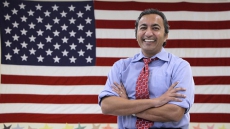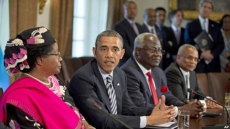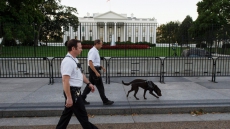WASHINGTON — If you took the millions of people touched by U.S. President Barack Obama's immigration announcement Thursday and gathered them together, their ranks would rival the population of Canada.
The president announced legal rights for almost five million people who are undocumented immigrants — a move that would impact not only them, but also their families, communities and workplaces.
"You can come out of the shadows and get right with the law," Obama said in a statement from the White House.
"That's what this deal is.
Under the plan, nearly half of the 11 million undocumented immigrants in America get a stay of deportation if they meet some conditions. Federal resources get re-allocated, steered away from deportation and toward the pursuit of specific types of criminals under a plan dubbed, "Families, Not Felons."
Obama concluded by quoting the book of Exodus.
"Scripture tells us that, 'We shall not oppress a stranger, for we know the heart of a stranger. We were strangers once too,'" he said. "My fellow Americans, we are and always will be a nation of immigrants. We were strangers once too. And whether our forebearers were strangers who crossed the Atlantic or the Pacific or the Rio Grande, we are here only because this country welcomed them in and taught them that to be an American is about something more than what we look like or what our last names are or how we worship."
The Spanish-language Univision network interrupted its broadcast of the Latin Grammy Awards to air the president's prime-time address. A group of protesters celebrated outside the White House.
Across the country, some families will be screaming for joy. Others will be screaming for Obama's impeachment.
The rage within the ranks of the Republican party may be difficult to suppress. Already, the party leadership has had to push back against its own members demanding a government shutdown or an impeachment threat.
They say there will have to be consequences.
"If President Obama acts in defiance of the people and imposes his will on the country, Congress will act," the next leader of the Senate, Mitch McConnell, said hours before the announcement.
"We're considering a variety of options. But make no mistake: When the newly elected representatives of the people take their seats (in January), they will act.
"As the president has said, democracy is hard ... And he knows that this is not how democracy is supposed to work. Because he told us so himself."
The constitutional-law-professor-turned-commander-in-chief had long claimed that the law wouldn't let him act alone to reform a dysfunctional immigration system.
Now, with a wave of the presidential wand, Obama did just that.
He argued that it follows legal precedents set by numerous presidents. He did not dwell on another design feature: that it's timed to create maximum headaches for the Republican party.
The plan establishes a three-year relief from deportation — right through the next presidential election. Which means that a Republican party bitterly divided over this issue may be stuck dealing with it in 2016.
An immigration bill sits frozen in the Republican-dominated House. Fearing an internal revolt, the party leadership did the same thing on immigration that Democrats did with another famous issue that splits their own party in the Senate, the Keystone XL pipeline: they avoided a vote.
With the omnibus bill stalled, Obama turned to federal lawyers for advice.
He asked what he might do through executive order instead. Such orders aren't as powerful as a law because they can be cancelled by the next president, or by a court that deems they've violated the will of Congress.
Still, a president has power. He controls government agencies — including border services.
They'll now be instructed against deporting people who've been in the U.S. illegally for more than five years and whose children are legal citizens or residents. Once they pass background checks and pay fees, they would be granted a three-year reprieve from deportation and work permits.
Obama will also broaden a 2012 directive that deferred deportation for some young immigrants who entered the country illegally. He will expand the eligibility cutoff three years to 2010, from the current 2007.
Mentioning his daughters, Obama said the beneficiaries include children who are as American as Malia and Sasha are — except for the circumstances of their birth.
They also work in restaurants, hotels, and construction sites across the country:
—According to the Pew Center, unauthorized immigrants represent four per cent of the U.S. population, 5.4 per cent of its workforce, and 6.8 per cent of its school students if you include U.S. citizens born to illegal migrants.
—They're three-quarters Hispanic, with just over half from Mexico. Nearly half live in three southern states — led by California, Texas and Florida. But they're across the country, with huge numbers also in New York, New Jersey and Illinois.
—They make up a whopping 12 per cent of the labour force in Nevada — which is where Obama will head Friday to make a speech promoting his plan.
—This affects the entire labour market — hurting poorer Americans, helping richer ones, and contributing to income inequality, according to different studies by labour economists.
Because illegal migrants can't job-hunt on the open market, they're forced to take lower salaries, which economists say can drive down pay for their American-born colleagues.
"Are we a nation that tolerates the hypocrisy of a system where workers who pick our fruit and make our beds never have a chance to get right with the law?" Obama said.
"Or are we a nation that gives them a chance to make amends, take responsibility and give their kids a better future. Are we a nation that accepts the cruelty of ripping children from their parents’ arms or are we a nation that values families and works together to keep them together?"
A TV actress emerged this week to share her family's story. Diane Guerrero, who plays a cameo role in the popular show, "Orange is the New Black," wrote a piece in the L.A. Times explaining how her family was deported when she was 14.
She said she grew up knowing they could disappear at any moment; they'd entered illegally and had failed in persistent attempts to get legal papers. One day, when she got home from school, she found their cars in the driveway but the house empty.
"Not a single person at any level of government took any note of me. No one checked to see if I had a place to live or food to eat," she wrote.
"And at 14, I found myself basically on my own."
Because she was born in the U.S., she was allowed to stay. But she said she spent the rest of her youth relying on the kindness of friends' parents, fearing that she might overstay her welcome and be out on the street.
In a tearful appearance on CNN, Guerrero spoke about visiting her family once a year now, in Colombia: "We've been separated so long sometimes it feels like we don't know each other... It hurts."





